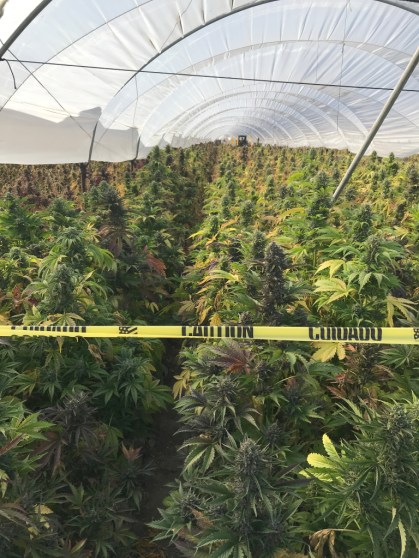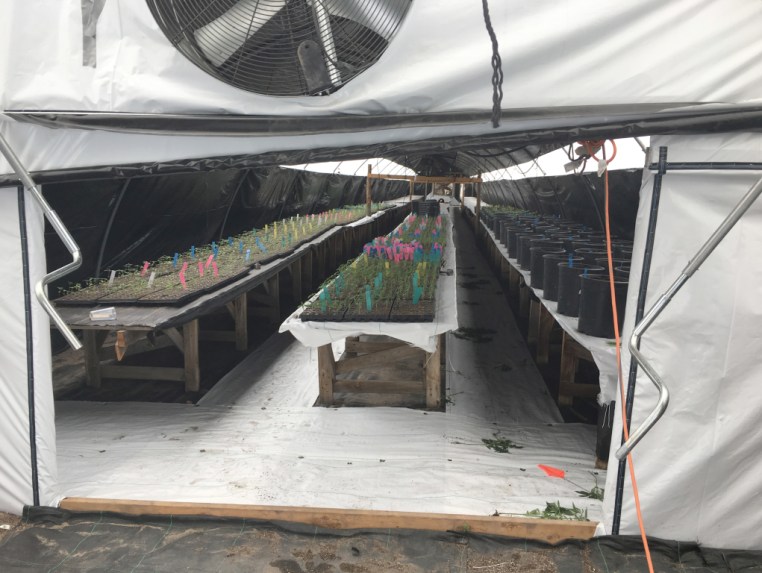20 Tons of Cannabis Seized During Four-Day Raid
Sheriff’s Cannabis Compliance Team Leads Massive Bust in Buellton

A team of 35 law enforcement officials led by the County Sheriff’s Cannabis Compliance Team spent four days last week eradicating 350,000 cannabis plants from a licensed grow in Buellton on Highway 246 and seizing 20 tons of processed cannabis product. The high-profile raid took place as the political temperature surrounding cannabis in Santa Barbara County has achieved new heights. Sergeant Frank Vasquez, who leads the Cannabis Compliance Team, was closed-mouthed regarding details, suggesting only that further enforcement actions might follow.
The property in question is owned by Luis Cisneros and Cisneros Future LLC. Calls to Cisneros and his attorney have not been returned. Cisneros has not been arrested, and no charges have been filed. According to the statement released by the Sheriff’s Office, the raid culminated a two-month investigation into whether Cisneros obtained his temporary and provisional cultivation licenses for this operation from the state by fraudulent means. In the context of licensed cannabis operations, that fraud typically involves perjury, or lying about how long one has been cultivating marijuana.
Under rules adopted by the County Board of Supervisors in 2018, growers cultivating medicinal marijuana prior to January 19, 2016, would be afforded “legal nonconforming status” if they signed affidavits stating that was the case. County administrators opted not to check the veracity of these statements, explaining they lacked the staff to do so.
Had county supervisors looked into Cisneros’s claims at the time, they would have discovered he hadn’t purchased the land in question — 1807 West Highway 246 — until January 29, 2016, ten days past the deadline to qualify as legal nonconforming. In fact, the actual farm — Organic Green Farm — did not incorporate until March 19, 2018. Since then, Cisneros had obtained both temporary and provisional licenses and was in the process of securing a land-use permit from the county. He did so on the basis of an unverified affidavit signed March 30, 2018.
Cinseros’s operations aroused the ire of several neighbors, according to the Sheriff’s Office, including boutique winery owner Blair Pence, who complained that Cisneros’s grow was lit up at night with artificial lights and that its odors contributed to his wife’s chronic headaches.
To date, criminal perjury charges have been filed against six other cannabis growers under similar circumstances. Of those, five have pleaded not guilty, and one pleaded out. After-the-fact questions about the veracity of such affidavits could prove thorny in the months ahead as various cannabis-cultivation applications wend their way through the county’s land-use permitting process and then have to endure further review during the appeal process.
State Senator Hannah-Beth Jackson raised this very issue this week in Sacramento, casting the sole Democratic vote against a bill sponsored by Governor Gavin Newsom to extend the expiration date of state provisional licenses from one year to five. Under the bill ultimately hammered out by the Senate, a two-year extension will be allowed. In addition, Newsom sought unlimited relief from environmental review. When the state’s environmental community came unglued, Jackson recounted, a more limited period of relief was approved.

Driving the changes is the regulatory logjam of cannabis operators racing to perfect their applications before deadlines expire. The state lacks the staffing levels to handle the load, Jackson stated, and county governments — like Santa Barbara — are struggling as well. Jackson sought four changes that would tighten up the language — especially one requiring greater scrutiny for false statements of legal nonconformance — but got nowhere for her efforts.
Santa Barbara County, she explained, is unique among all 58 counties for the problems it’s encountered accommodating the new cannabis industry. Her fellow Democrats, she said, were more concerned about environmental safeguards. When the governor’s office compromised, she said, they went along with it.
“It’s a very delicate balance,” Jackson said. “You don’t want to drive good operators underground into the black market. But there are other people who wouldn’t know a rule if it hit them over the head.”
Critics of the county’s regulatory approach have pointedly and disapprovingly noted that Santa Barbara has more licenses than any other county in the state. According to Dennis Bozanich, charged with bird-dogging the issue for the County CEO, that distinction now belongs to Humboldt County, which he stated now has 151 more licenses than Santa Barbara.
That change, he stated, was a function of the rate of attrition caused by county’s strict regulatory regime. Over time, he said, many operations have given up on the permit application process, meaning they either went out of business or are flying under the radar illegally. In that case, he said, they are subject to immediate enforcement action.




You must be logged in to post a comment.